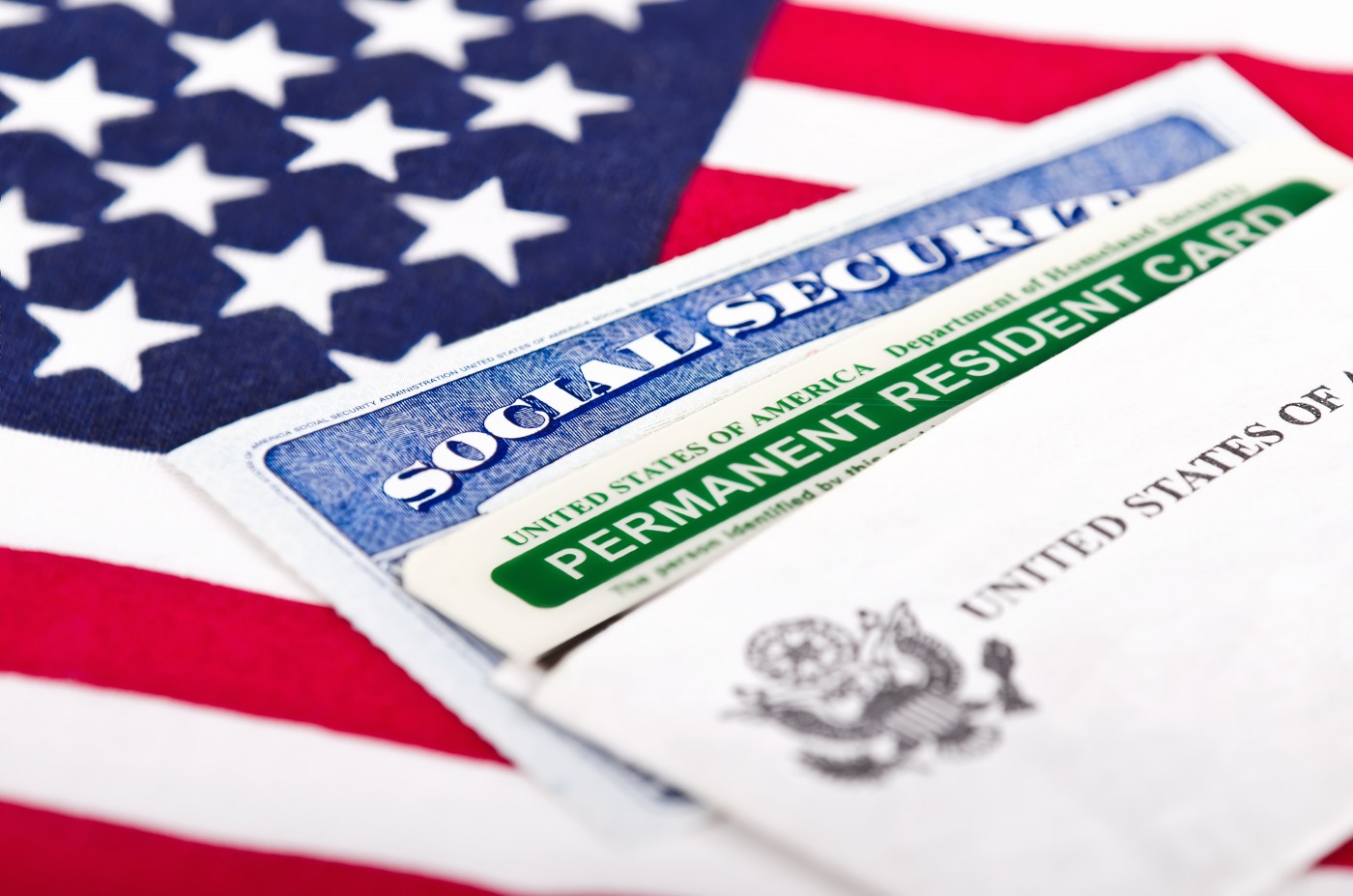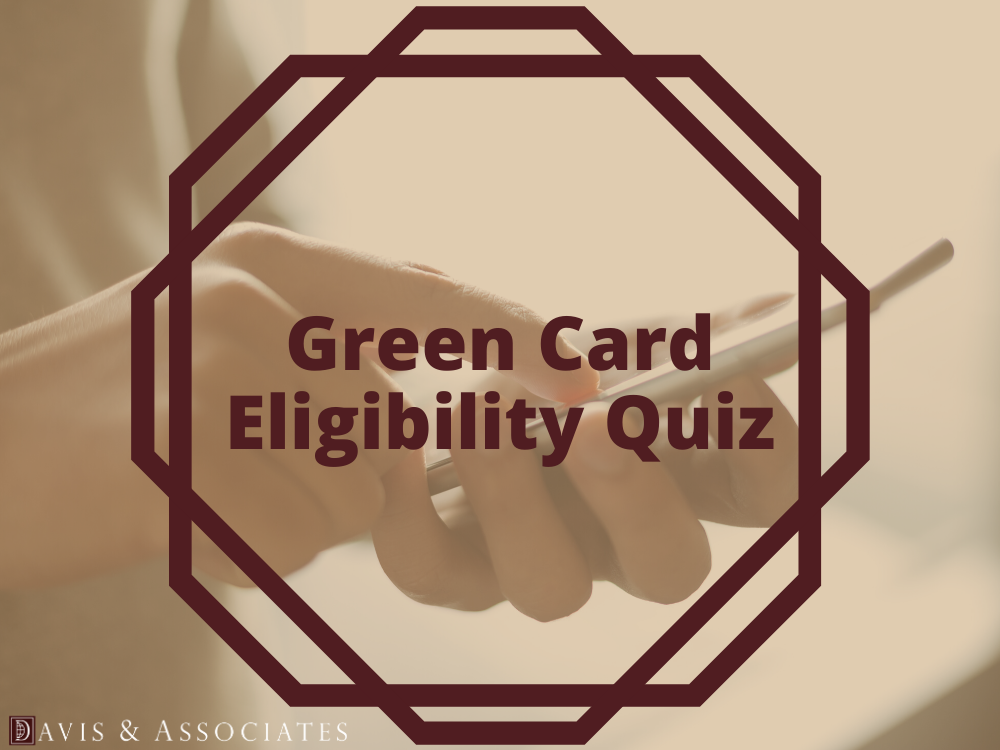UNITED STATES IMMIGRATION: GREEN CARDS
Obtain Lawful Permanent Residency
Highly sought-after green cards grant a holder lawful permanent residency in the United States. Green card holders are not citizens, but they can live and work in the U.S. indefinitely.
If you are in pursuit of a green card, Davis & Associates can help you in the process. We offer comprehensive counsel and compassionate guidance to green card seekers in Texas, throughout the U.S., and around the world. Rest assured that your case is in good hands with our Texas green card attorneys.
You can also read our testimonials to see what others have to say about Davis & Associates.

Green cards originated shortly after World War II, and have continued to be a bastion of legal immigration to the present day. Interestingly, the green card has not always been green! Also, many are surprised to learn that the green card is not accessible to various groups of immigrants, and it can be difficult to gain one. Green cards are not visas. In fact, they confer lawful permanent resident status.
Are You Eligible For a Green Card?
 Within the United States (U.S.), acquisition of a green card is the key to permanent residence. In fact, the proper legal term for a green card holder is “lawful permanent resident” or LPR. When someone holds LPR status, with patience and practice they can eventually become a naturalized U.S. citizen.
Within the United States (U.S.), acquisition of a green card is the key to permanent residence. In fact, the proper legal term for a green card holder is “lawful permanent resident” or LPR. When someone holds LPR status, with patience and practice they can eventually become a naturalized U.S. citizen.
Because green cards are a key to lawful and permanent residence in America and allows a person to confidently begin to build a life, career, and family on U.S. soil, many people wish to apply for them. But there are strict rules and regulations regarding who is eligible for a green card. And if even if a person is eligible, the application can be long and arduous, though obviously worth it should the final outcome be positive.
Green Card Eligibility Categories
The USCIS lists all green card eligibility categories on its website. You can read the information in its entirety here. In order to be eligible to apply for consideration for a green card, you or a loved one should fit into one of these categories. If you aren’t quite sure which category may apply, or if there’s another option, the best person to help is an experienced immigration attorney. Below we list the specific green card eligibility categories found on the USCIS’s website.
- Family
- Employment
- Special Immigrant Status
- Refugee or Asylee Status
- Human Trafficking or Crime Victims
- Victims of Abuse
- Other Categories
- Through Registry
Some of the above eligibility categories are obvious. For example, anyone applying for a “green card through family,” should have a sponsor that is an immediate family member. Yet, other categories, like “Green Card through Other Categories” may be more confusing. For your benefit, we briefly describe each category below.
Green Card Through Family
 A person may be eligible to apply for a green card through family if they are the immediate relative of a U.S. citizen or lawful permanent resident (LPR), a fiancé(e) of a U.S. citizen, a widow(er) of a U.S. citizen, or an abused relative of a U.S. citizen or LPR.
A person may be eligible to apply for a green card through family if they are the immediate relative of a U.S. citizen or lawful permanent resident (LPR), a fiancé(e) of a U.S. citizen, a widow(er) of a U.S. citizen, or an abused relative of a U.S. citizen or LPR.
The USCIS defines “immediate relative” as any spouses, unmarried children under 21, and parents over the age of 21. Other relatives, such as adult or married children and siblings, may also be eligible, but will likely receive lower priority. This simply means that some familial relations will receive quicker and broader access when the USCIS considers awarding green cards. The USCIS discusses family-based preference categories in full detail on its website.
Green Card Through Employment
You can acquire a green card as an immigrant worker. But first priority for these green cards is available to a very specific group of foreign professionals. According to the USCIS, first preference “priority workers” are those with “extraordinary ability in the sciences, art, education, business, or athletics,” as well as “outstanding professors or researchers” and “certain multinational managers and executives.” Obviously, other classes of immigrant professionals exist, but receive lower preference.
Other people who can acquire a green card via employment means are certain classes of physicians and immigrant investors. You can read more on the USCIS’s eligibility categories page, linked earlier in this article.
Green Card As A Special Immigrant
The USCIS considers certain special immigrants when allocating green cards. These include certain religious workers, special immigrant juveniles who have suffered abuse, international broadcasters, and members of select international organizations like NATO.
Green Card Through Refugee Or Asylee Status
Obviously, anyone applying for a green card via this eligibility category must already have been awarded either refugee or asylee status. Foreign nationals receive these statuses through special consideration processes that often involve in-depth and complicated applications and interviews. In both instances, asylees and refugees can apply to become lawful permanent residents after 1 year of relevant status.
Green Card For Human Trafficking And Crime Victims
This very special category of green cards are only available to those who are already in possession of specific nonimmigrant visas. For human trafficking victims, this is a T nonimmigrant visa, and for crime victims, a U nonimmigrant visa.
Green Card For Victims Of Abuse
Some victims of abuse may be eligible for a green card. These include VAWA self-petitioners, who are also eligible via the “family” category. VAWA self-petitioners are the abused immediate family members (spouses, parents, children) of U.S. citizens, and in some cases, lawful permanent residents. Another group of immigrants eligible under this category are “special immigrant juveniles.” According to the USCIS, these juveniles have been abused and abandoned and assigned this status via the U.S. court system. Other victims of abuse qualifying under certain government acts, like the Cuban Adjustment Act, may also be eligible.
Green Card Through Other Categories
This section compromises all various foreign nationals who may be eligible to apply for a green card but do not fit any other category. One notable group within this category are those who receive diversity visas. Diversity visas are awarded via the Diversity Visa Lottery Program, and provide a path to a permanent life in the U.S. for those who otherwise have no way to apply. A total of 50,000 diversity visas are made available each year via lottery.
There are several other types of immigrants eligible for green cards under this category. Therefore, you can read more on the USCIS’s website.
Green Card Through Registry
A unique category, some people who have “been present in the United States since January 1, 1972” may be eligible for a green card. According to the USCIS, to apply via this category, the candidate must:
- Have lived continuously in the U.S. since January 1972;
- Be of upstanding moral character;
- Be eligible for naturalization; and
- Not be deportable or inadmissible or hold any bars to adjustment.
Sponsorship
In nearly every situation, the United States Citizenship and Immigration Service (USCIS) requires that immigrants seeking permanent residency have a sponsor. For example, a sponsor can be a family member or employer. Sponsors must submit specific paperwork to the relevant authorities, effectively petitioning for the applicant.
A sponsor may need to submit an Affidavit of Support, accepting financial responsibility for the petitioner. The best way to prepare to be a sponsor is to talk with an immigration attorney with experience in green card applications.
Responsibilities Of Green Card Sponsorship
USCIS allows Green Card sponsorship in the following categories:
- Sponsoring a Relative: Green Card through family
- Sponsoring an Employee: Green Card through Employment
- Sponsoring a Special Immigrant: see eligibility definitions at the USCIS website
Green Card sponsorship, whether for a family member, employer, or someone who has committed to taking full financial responsibility requires completion of an application process to become a legitimate sponsor. The process can be complicated, so consulting with an experienced immigration lawyer is advisable.
Who Can Be A Green Card Sponsor?
Being a Green Card sponsor carries important and lasting responsibilities. The most important is to assure complete financial responsibility for the candidate until they either become a U.S. Citizen or have proven to work for 40 quarters, or 10 years.
A sponsor for any immigrant candidate for Green Card status must be at least 21-years of age and a United States citizen or a permanent resident. The sponsor must maintain a primary domicile in the United States or a U.S. territory.
In the process of applying for a Green Card for any candidate, the sponsor must verify sufficient income and net worth to support themselves and other family members as well as the applicant.
What Is An Affidavit Of Support?
The USCIS wants to assure that every individual who comes to reside in the United States will have sufficient financial support to never require assistance from the government. To this end, sponsors are required to complete an Affidavit of Support or Form I-864.
The Affidavit of Support is a legally binding commitment by the sponsor for Green Card sponsorship to make sure the immigrant, in addition to the family of the sponsor, will be adequately supported.
Sponsors must certify that their income levels are at least 25% above the existing Federal Poverty Guidelines. If the sponsor is on active duty in the U.S. Military and wishes to sponsor a Green Card applicant, the income must be at least equal to these federal guidelines.
The Affidavit of Support is legally binding for Green Card sponsorship until the candidate becomes a U.S. citizen or has worked for 40 quarters, usually ten years.
Sponsoring A Relative For Permanent Residency
The path to Green Card sponsorship begins with completing a Petition for Alien Relative or Form I-130. Priority is given to individuals who are immediate relatives of U.S. citizens, such as spouses, unmarried children under 21 including orphans, and parents. Additional categories of family members, who may be eligible but at descending preference levels, are:
- Adult children of U.S. citizens
- Spouses and unmarried children of Permanent Residents
- Married sons and daughters of U.S. citizens
- Brothers and sisters of U.S. citizens and families
Sponsoring A Foreign Employee
Often U.S. companies and organizations require services and skills that may best be sourced in foreign countries. Many of these companies initially sponsor these individuals for H-1B visas which have a three-year time limit that is renewable for up to three more. However, the quota for H-1B visas is currently being reduced, and competition for these permits is stiffening.
Employers, however, may apply for permanent residency for foreign-born employees. The first step is to complete a Form I-140, an Immigration Petition for an Alien Worker. The employer must additionally prove that hiring the foreign employee does not negatively impact market wages or impact the hiring prospects of U.S. citizen candidates.
Employees with extraordinary skills and training who are currently working in the United States on a legal visa may also apply for Adjustment of Status to become a Green Card holder. The employer will be asked to provide a letter of proof of employment.
Bars To Adjustment
As with any U.S. immigration process, it is not easy to become a lawful permanent resident. Green card holders undergo rigorous screening and application processes, and there are several reasons that someone may be ineligible to apply. These are called “bars to adjustment.” According to the USCIS, bars to adjustment are listed in the Immigration and Nationality Act (INA). If one or more of the bars to adjustment listed in the INA apply to a candidate, they are likely ineligible to become a lawful permanent resident.
Some examples of bars to adjustment include:
- Criminal convictions within the U.S. or abroad;
- Previous terroristic ties or activities;
- Violation of visa terms or restrictions; and/or
- Engagement in unauthorized employment.
Other bars to adjustment exist and you can read about them on the USCIS’s website. If you think that you may be ineligible to apply for a green card due to such reasons, it is essential to consult an immigration attorney. You may have options.
How To Obtain A Green Card
There are a few different ways to obtain a green card. You can do so through employment, through family sponsorship, as the victim of abuse, as a special immigrant, through registry, or through refugee or asylum status.
Regardless of how you apply for a green card, you will complete one of two processes:
- Adjustment of status: If you are already present in the U.S., you can apply to adjust your current immigration status to a lawful permanent resident
- Consular processing: If you are outside the U.S., you can visit a U.S. consulate abroad to apply for a green card
Consular processing is generally a faster, cheaper, and more reliable process. However, those who go the consular processing route may be unable to visit the U.S. while their immigrant visa is pending.
Benefits Of A Green Card
Though a green card does not grant you the full rights of a U.S. citizen, you do enjoy certain benefits that other visa holders do not receive.
As a green card holder, you can:
- Apply for citizenship after five years
- Sponsor certain relatives for visas or green cards
- Travel in and out of the U.S. more easily
- Spend less on college, university, or vocational school tuition
- Renew your green card every 10 years
- Make financial contributions to U.S. election campaigns
Our green card holder attorneys in Texas understand the significant benefits that come with being an LPR, and we want to help you achieve this immigration status. We provide the reliable counsel and compassionate guidance you need to reach this goal.
The Importance Of A Green Card Lawyer
Acquisition of a green card is, quite literally, the gateway to building a permanent life in America. Once you are a lawful permanent resident, you begin your journey on the pathway to naturalization and U.S. citizenship, should that be your goal. But the application and sponsorship process for green cards can be complicated and difficult to navigate. Ultimately, the best way to know if you are truly eligible for a green card is to talk to an immigration lawyer.
An experienced lawyer with a deep understanding of the green card application process will help you in many ways. First, they’ll help you avoid application errors or omissions, which can lead to unnecessary delays or denials. Also, lawyers can help you should any issues, questions, or problems arise during your application.
Ready To Apply? Talk To An Expert Green Card Lawyer
The passionate attorneys at Davis & Associates serve clients in Dallas, Fort Worth, Houston and across Texas. There’s no need to navigate the green card application process alone – we can help. Contact us today to set up a free initial consultation. We will review your case, let you know your options, and provide a path forward.
Talk with an attorney at Davis & Associates today either as a sponsor or candidate for a free initial consultation to discuss your green card needs. Call 214-628-9888 or leave your information so one of the Davis & Associates professionals can phone you.
Take Our Green Card Eligibility Quiz!


